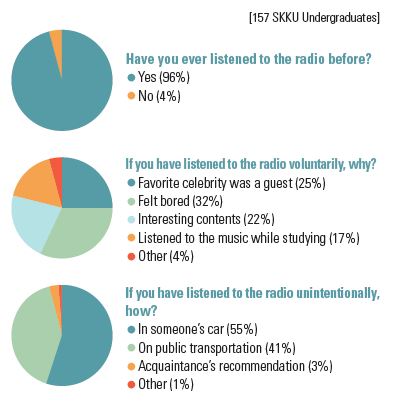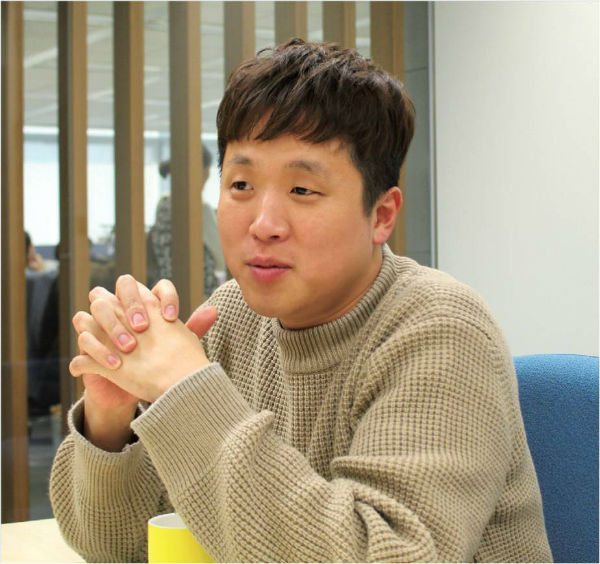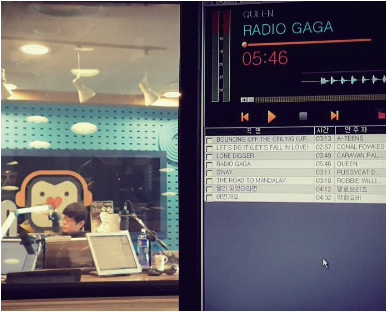Television broadcasting has always been the most popular form of media, but with the emergence of online entertainment, internet broadcasting such as single media has grown from strength to strength. Many creative producers are now establishing their own broadcasting channels to express what they want to show to the public. In this age of multi-media, however, there is still our old friend, the radio. How has radio overcome this competitive atmosphere? The Sungkyun Times (SKT) now explores the past and the present of Korean radio broadcasting, with a view to help Kingos to revive the meaning of radio in our lives today, by interviewing a radio broadcasting producer.
Past and Present of Radio Broadcasting
One of the most popular forms of entertainment pleasure for the people of the past was radio. For example, radio dramas that featured the voices of actors in studios gained huge popularity in the 1960s and 1970s, maintaining listener ratings of more than 30%. In addition to this, most middle and high school students listened to music programs such as Starry, Starry Night. Diverse media such as TV and Internet, however, has started to take the place of radio. To make matters worse, many online content services have deepened the crisis of a decline in listeners that surrounds the radio today.
The development and popularity of podcasts, services that offer a series of episodic digital media files including news, drama, and music, seemed to worsen the crisis, but now radio broadcasters are trying their best to improve radio’s image and increase accessibility to radio by providing a greater variety of online services. There are integrated radio platforms, and applications such as KONG of KBS, Mini of MBC, and Gorilla of SBS that offer many different services for radio listeners. For example, when using the SBS Gorilla application, people can listen to real time radio programs and repeatedly listen to them in audio or video file formats without being subjected to advertising. They can also see a chart of the daily selected songs of the program and listen to them individually, if they wish.
How Do SKKU Undergraduates Listen to the Radio?

Interview

Me
Q1. Please introduce yourself.
I am June Yoon, a producer at the Seoul Broadcasting System (SBS) Radio station. I was previously an assistant director at Escape at 2pm, Cultwo show, Choi Hwa Jeong’s Powertime, a producer of Sweet Sorrow’s Tenten Club and Kim Young Chul’s Fun Fun Today . Now, I am producing This Beautiful Morning with Kim Chang-wan which is also known as “Morningchang”.
Q2. Did you always want to be a radio producer?
Ever since childhood, I always loved to introduce music that I knew to people, probably like most radio producers. In particular, when I was a middle school student, I recorded music that I liked from radio to cassette tapes and played them to my friends. I have never forgotten the feeling that I got when they enjoyed the music I chose. In addition, I usually listened to the radio during my school years, and was deeply touched by music that included personal stories. From these experiences, I used to imagine becoming someone related to radio. After taking the recruitment examinations at several broadcasting companies, I passed the test at SBS.
Life as a Radio Producer
Q3. What is the most memorable episode that you experienced during your life as a producer?
I would love to share some broadcasting incidents, but most of them have been wiped from my memory. I will share with you the most memorable story that I can remember about a listener. Morningchang consists of four parts. Recently, there was a message from a housewife at the end of part two. She said, “My child is throwing a tantrum because he doesn’t want to go to kindergarten. He says that he will go if Mr. Kim Chang-wan says ‘Hey, let’s get going.’ Please do it for us.” Mr. Kim did so, and after beginning part three, we got the message “My child and I just left home in a good mood. Thank you.” There are many great examples like this that have happened, thanks to the real-time communication with the listeners that is only possible through radio. I think that this differentiates radio from other media.
When I was a director of the program Sweet Sorrow’s Tenten Club, a member of Sweet Sorrow named Kim Young-Woo, was about to be married and the staff, as well as the other three members of Sweet Sorrow, secretly promised to sing a wedding song during the live broadcast. When we sang the wedding song for him, Kim Young-Woo was really surprised, and I thought that this also is a story which is possible only on radio.
Q4. What is the most important aspect to consider when producing?
I think radio programs should keep a sense of fun and inspiration. It may be that they are funny, or that they bring a lump to your throat. I put most of my effort into thinking about how to make people laugh and cry. In addition, people these days can listen to the music they want quite easily through the Internet, unlike in the past. Therefore, finding “good” music that is not easily found in the music charts is one of the most important assignments for me, and other radio producers.
Q5. Tell us about the production process of radio programs.
If it is a newly launched program, the Chief Producer (CP) and Program Director (PD) discuss and decide upon an appropriate Disk Jockey (DJ). Then, the PD looks for writers and builds a staff team to fit the program. Through a meeting with the writers, we plan a weekly section composition, ‘corner’. We also discuss the topic of the day, the topic of the message, and the guest, by each corner. The writer writes the script, and then we select songs based on the script as soon as the script is completed. Next, we give a cue sheet and script to the DJ to help him or her to become accustomed to it. Then we go on-air. After the broadcast, we monitor it and prepare for the program of the following day.
I think many people wonder how we choose DJs or guests. It really depends on the purpose and the atmosphere of the program. For example, Lee Guk Joo’s Youngstreet is an active program with a comedian DJ, so comedians and idols are usually cast as guests. On the contrary, Morningchang is a calm music program that people can listen to in the peace of the morning, so we cast people such as music reporters or guitarists as guests.
About Radio Itself
Q6. It is not an exaggeration that radio programs are now in crisis due to the emergence of on-demand TV, and the Internet. Why do you think people still listen to the radio?
I think that multitasking is one of the reasons that people still listen to the radio. For example, people listen to the radio while doing other things such as driving, studying, and working. They cannot do those things while watching videos or TV programs. People are busy nowadays, and most people do not want their time to pass meaninglessly. Radio helps people to satisfy this craving since people feel comforted by radio, even though they do not listen to the radio with the most perfect concentration. In addition, radio is a medium that conveys people’s own stories to others, while TV does not reflect their stories that much. Since stories of people are a significant content of the radio, radio and its listeners need each other to work.
Q7. What do you think the most charming aspect of radio is?
After becoming a radio producer, radio has become considered more attractive than before. Radio programs are usually broadcasted live and daily, and contain stories of everyday lives. This makes anyone able to share their lives, whether they are working or driving, or whether they are staff or listeners. This characteristic of broadcasting in real-time is a lot different from TV, since TV programs are filmed and edited in advance to have a higher cinematic quality. I think radio programs themselves reflect the imperfections of our daily lives instead of having this high cinematic quality.

Q8. What do you think about the future of radio?
In the past, we could listen to our favorite shows through a radio receiver. Today, however, we can listen to broadcasts through a range of devices such as computers, smartphones, and tablet PCs. This is because, an operating system we call ‘platform’ have developed and changed, and there was an opportunity for radio broadcasting to be placed on these platforms. It has led to the barriers of producing radio broadcasts to lower, as people now freely make podcasts and YouTube broadcasts. Simultaneously, contents producers all over the world are competing to make high quality content while maintaining many of radio’s original charms such as communicating with listeners.
Q9. Any last words for the Kingos?
I heard that the young generation, especially undergraduates, feel that it is hard to earn higher credits or get a job. I have also heard that in contrast to the old days, young people must do many things such as participate in contest exhibitions, and attend exchange scholarships, in order to accumulate achievement experiences. Nevertheless, I want you to have fun and enjoy life while you are young. Try to think about the world, although you may feel as though society has left you to look after yourself. Enjoy your life and be happy!
The advance of mass media has threatened radio, however, radio still connects people by conveying one’s story to another in real time, which is a lot different from the edited world of TV programs. Listening to various stories through the radio that are similar to our stories, allows us to laugh and cry together. Like a friendly greeting from your family in the morning or a refreshing cup of tea in the afternoon, how about choosing radio as one of the great comforts in your life?
